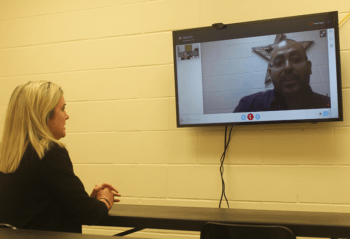Using Telehealth Technology To Provide Mental Health Counseling For Inmates

Texas A&M Health’s Telebehavioral Care Clinic now has a contract with the Washington County Jail to provide mental health counseling to inmates.
For the past 10 years, the Telehealth Telebehavioral Care Clinic has brought health care to rural populations in need of mental health care through telehealth technology. Doctoral students in counseling and school psychology from the College of Education and Human Development work in the clinic under the supervision of licensed psychologists, counseling those who would otherwise not receive such services. Now, the clinic has expanded its scope of impact into the prisons.
“This program will do great things for the inmates,” said Isaac Saldivar, a psychologist at the clinic. “We finished a three-month trial period to test out the group and individual counseling with the jail and we already noticed improvements with the inmates. We also noticed a gain of trust and an overall increase of interest in the program.”
Saldivar meets with the inmates on a weekly basis via a secure, HIPAA-protected video platform. He counsels on issues such as anger management, depression anxiety and trauma.
Individuals released from the Washington County Jail will be able to easily schedule follow-up appointments at the clinic’s Washington County access point so they can continue their counseling once they are released from prison.
With more than 10 million individuals in prison at any given time and more than 30 million circulating through each year, the inmate population represents a large part of our communities. Roughly 27 percent of state and federal prisoners* have been told by a mental health provider that they have a mental health disorder, and many do not receive services in jail that they need to manage it.
“With the physical barriers that come with residing in prison as well as the tight budgets of many Texas counties, mental health is often not a priority in our jails and prisons,” said Carly McCord, director of Telebehavioral Care at the Texas A&M University Health Science Center (Texas A&M Health). “The beauty of telehealth through the Texas A&M Health Telebehavioral Care program is that we can transcend those physical and financial barriers to bring mental health to our Texas inmates.”
Telehealth uses technology for direct service or as an adjunct to health care services. For example, video conferencing, wireless communications, remote data collection and image streaming through the service allows health care professionals to reach patients who cannot make it to a clinic.
“Distance, lack of transportation, cost and a lack of providers are all mitigated by telehealth,” McCord said. “That being said, telehealth is a great solution for bringing health care to our correctional facilities.
“Telebehavioral care is more than a solution to the limited access to mental health care in rural Texas,” McCord said. “It is a solution that can be applied everywhere. We are looking forward to watching the initiative grow.”
* This link is no longer active and has been removed.
This article by Mary Leigh Meyer originally appeared on Vital Record.





